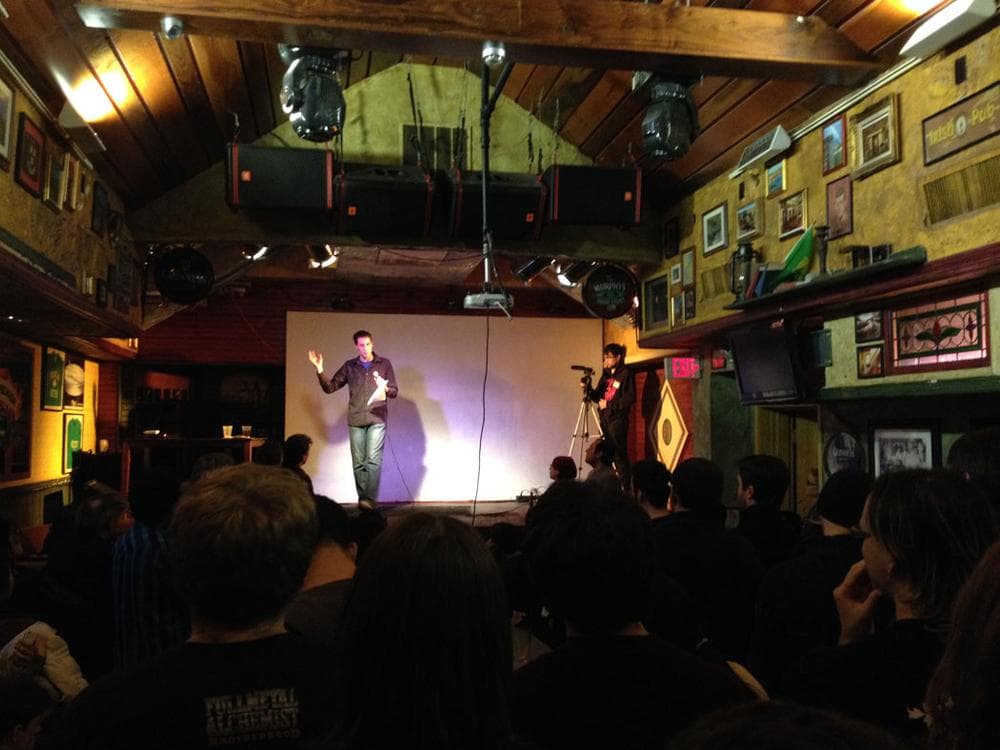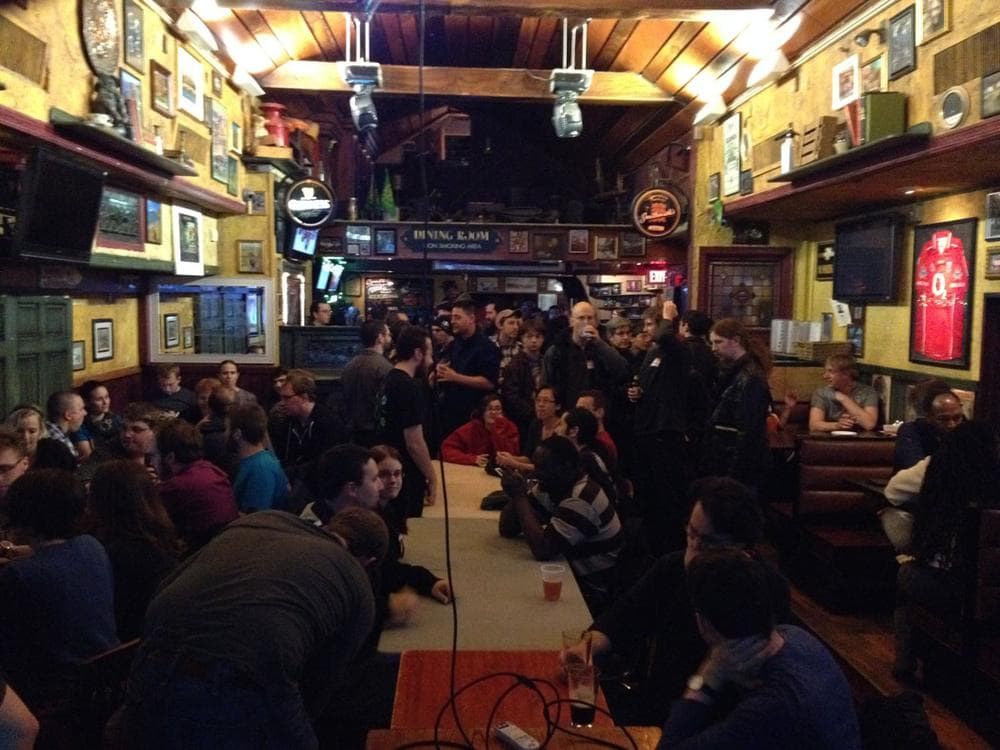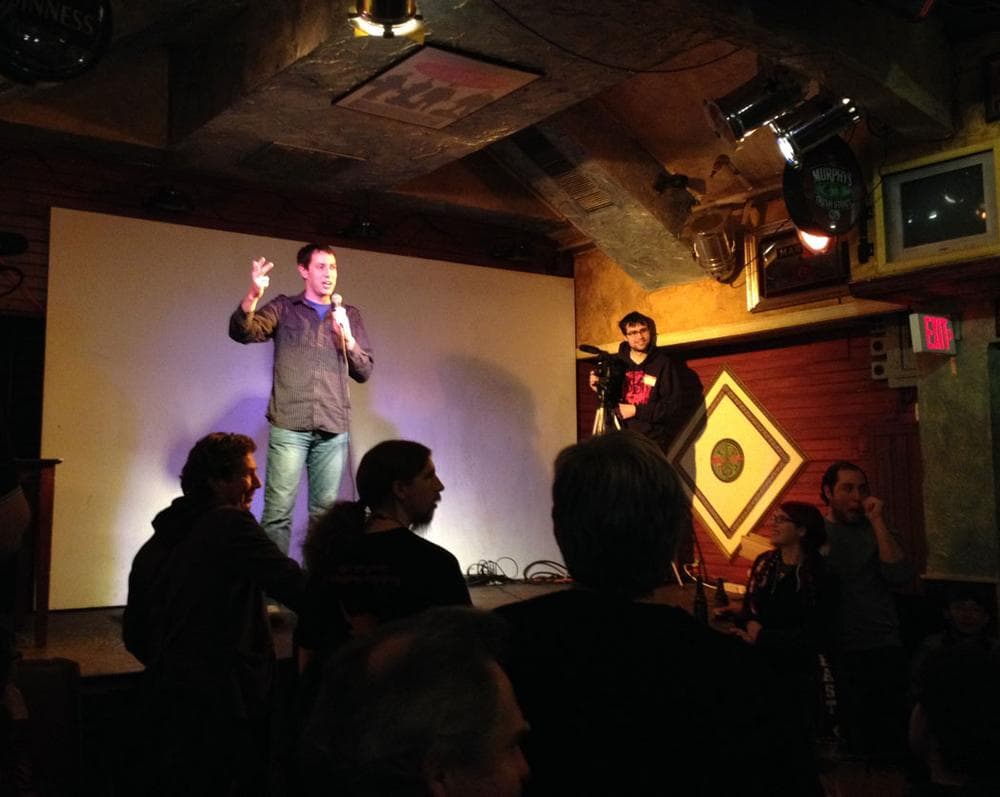Advertisement
Good Beer Meets Good Video Games At Boston Post Mortem

A speaker, food and beer—those were the three pillars of what would become the monthly video game developers meetup Boston Post Mortem when game developer Rick Goodman organized an event for local colleagues at John Harvard’s Brewery & Ale House in Cambridge in the fall of 1997.
The “official” founding of Boston Post Mortem took place at a game developer's conference at Hynes Convention Center in 1998, under the direction of Steve Meretzky, perhaps best known for his collaboration with Douglas Adams on the computer game version of “The Hitchhiker’s Guide to the Galaxy,” which was published by Cambridge’s Infocom in 1984.
“I took advantage of that [conference] to have a session called ‘Let's Get Organized,’ with the goal of starting a regular get-together of Boston-area game developers,” Meretzky told me. “I'm going to guess that about 40 people attended that session. As part of that group discussion, we made many of the initial decisions that shaped Post Mortem.”
“Besides the informative nature of the talks and creating some local game industry camaraderie, BPM also would serve as a networking event for game developers,” said veteran game designer Les Nelken, who has been with Boston Post Mortem since its early days. “If you're lucky enough to be working in one of the most awesome industries in the world, you should be willing to help those wanting to join the club, and also warn them of the pitfalls.”
Boston Post Mortem was founded primarily to provide retrospectives on projects and pass wisdom on to colleagues and friends. Fifteen years later, it’s a testament to the vibrancy of our regional game development industry and in some cases—like this month’s meeting when the launch of a new local indie games incubator was announced—a sign of where the video game industry is going in the larger picture, as well.
The early meetings of Boston Post Mortem took place in the Parker House Hotel in Boston. When BPM outgrew that location, it moved to Christopher’s in Porter Square in Cambridge. And when BPM outgrew that location, it found its usual, current home at The Skellig, a pub in Waltham. “We needed a venue that had a separate space large enough to hold 60+ people and that wouldn't charge us for using the space. Plus good beer and food,” Nelken said.
Developers from all over New England, and occasionally from New York state, make up the monthly attendance of Boston Post Mortem. According to Nelken, Boston Post Mortem is one of the largest such groups in the United States. In 2008, BPM became an official chapter of the International Game Developers Association, or IGDA, a non-profit organization which, in part, advocates for video game developers.

I’ve been attending Post Mortem off and on for years to cover stories in my capacity as a reporter for the enthusiast video game press. Sometimes BPM plays host to out of town visitors, like a developer demo of the then-upcoming PlayStation Move motion control system by Sony representatives in 2010.
Most of the time the guests are local, but the topics often address industry-wide issues or concerns. Jon Radoff, the founder and CEO of local social game publisher Disruptor Beam, delivered a Post Mortem presentation in 2011 about avoiding the temptation to design social games, like those frequently published on Facebook, as “Skinner Boxes” to psychologically condition consumers into spending money. That design methodology almost always results in said game not being very good.
Boston Post Mortem was held this month on Thursday, Nov. 14, at Tommy Doyle’s, an Irish pub in Harvard Square, and the speaker was Eitan Glinert, the president of Fire Hose Games in Cambridge. He was a local speaker introducing a local initiative which, if successful, could have implications for game development well beyond New England.
While the Boston area is home to a handful of blockbuster or “triple-A” development studios, like Irrational Games, developers of the “BioShock” franchise which is famous as a rallying point for the consideration of video games as valid forms of art, or Harmonix, the studio that founded a music game genre with “Guitar Hero” and mastered it with “Rock Band,” the independent or “indie” game community is vibrant in Boston, owing to the large number of universities and the graduates of their technology programs.
Glinert, a graduate of MIT and alum of their Game Lab and Education Arcade programs, looms large in the indie community in no small part due to his brainchild, the Indie Megabooth. Realizing that indie developers had more to gain through cooperation than competition, Glinert organized a group of indie developers to pool their money together and purchase one, large, contiguous show floor space for everyone in 2012 at the Penny Arcade Expo East, a game culture event held annually at the Boston Convention and Exhibition Center which attracts up to 70,000 people a year."
Indie Megabooth, for which Glinert is currently an advisor, has become one of the highest-profile venues for independent developers in the video game industry, and at PAX East 2013 commanded attention from the enthusiast video game press and gathered one of the most refreshingly eclectic offerings of video game design that I’ve seen assembled at an event.
The success of the Megabooth reflects booming indie development as a whole. Steam, a digital distribution network for PC games owned by the storied Valve Corporation in Washington state, with a reported user base of 60 million, has become a major gateway for indie games to hit the market. Steam’s Greenlight program allows users to approve or “greenlight” new indie games, giving users access to those games while they are still in development, and giving the developers a fast track to a “Steam” release and sales of their games.

Glinert’s studio, Fire Hose Games, has had modest success with titles like “Slam Bolt Scrappers” and “Go Home Dinosaurs,” but perhaps in recognition that his company’s greatest wealth may be in their experience navigating the waters of indie development, the kind of experience which inspired the creation of the Indie Megabooth, Glinert announced at Boston Post Mortem that Fire Hose Games has re-invented itself as an indie incubator.
“There are hurdles to indie development. There are problems that every single indie has to deal with. Some of them clear the hurdles, and some of them don’t. What if a studio that has some resources came in and removed those hurdles for people?” Glinert said.
Fire Hose Games is taking a page from the tech industry. An incubator, put simply, is an amalgamation of venture capital and tech savvy pioneers, which spins out companies in which the venture capitalists own equity. Fire Hose Games plans to deviate from that pattern by, hopefully, keeping the developers they work with in-house for long-term, collaborative relationships.
The opportunity is only open to the greater Boston area, but local developers will have a chance to apply to Fire Hose Games for entrance into this incubation program. The accepted developers will receive a stipend, mentoring and feedback. Fire Hose will help promote games which are ready for the marketing cycle by leveraging the relationships it has built with the enthusiast video game press, in large part through Glinert’s promotion of the Megabooth.
“We’re going to be a multiplier on top of already awesome people to help them get to phenomenal heights,” said Glinert.
If there’s another, similar initiative to this in the indie game development world I haven’t heard of it. And while the basic idea is simple, the execution will depend on the ability of Fire Hose Games to attract the venture capital needed to back the project, without which the idea is stillborn.
But this is the kind of thing you get at Boston Post Mortem—sharing of knowledge, creation of opportunity, commiseration over the ebb and tide of fortune in the increasingly crowded and competitive video game industry, and also the drinking of beers.
You can’t forget the beers.
Dennis Scimeca is a Boston-based freelance writer. He is usually on the video game beat, and has been published on Salon, Ars Technica, and Kotaku. Follow him on Twitter: @DennisScimeca.
This article was originally published on November 25, 2013.
This program aired on November 25, 2013. The audio for this program is not available.